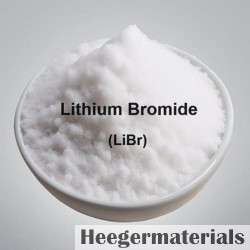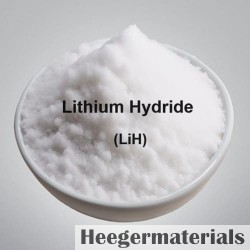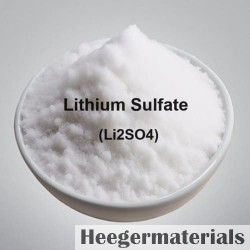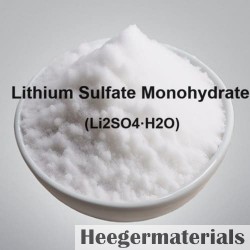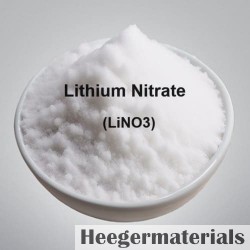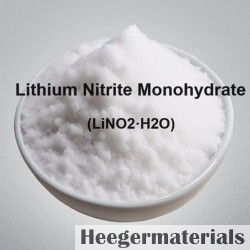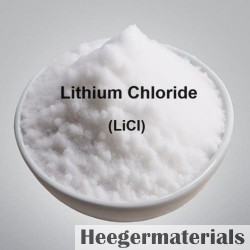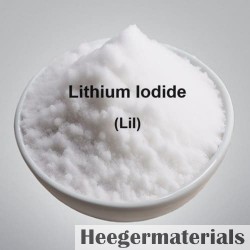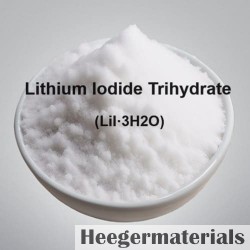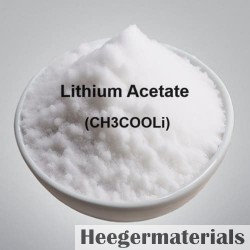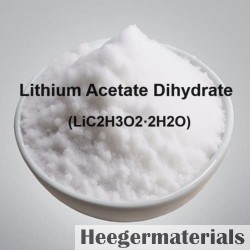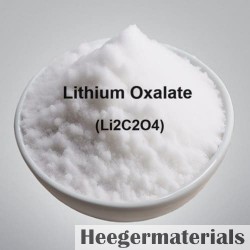Lithium Group Salts
- Products
- Deposition Materials
- Refractory Metals
- Rare Earth Materials
- Powder
- Technical Ceramics
- Lanthanum Hexaboride (LaB6) Materials
- Pyrolytic Boron Nitride (PBN) Products
- Boron Nitride (BN) Products
- Alumina Ceramics (Al2O3)
- Aluminum Nitride (AlN) Products
- Silicon NItride (Si3N4) Ceramics
- Silicon Carbide (SiC) Ceramics
- Graphite Products
- Zirconia Ceramic
- MAX Phase Ceramic Materials
- Boron Carbide Ceramics (B4C)
- Magnesium Oxide Ceramics (MgO)
- Quartz Ceramics
- Macor Machinable Glass Ceramic
- Beryllium Oxide (BeO) Ceramics
- Piezoelectric Ceramics
- High Purity Materials
- Precious Metals
- Chemicals
- Crystals & Substrates
- Applications
- Other
A professional supplier and manufacturer of high-quality Lithium Group Salts.
Lithium Salts refer to compounds containing lithium ions, including Lithium Chloride, Lithium Sulfate, Lithium Hydroxide, Lithium Carbonate, etc. They find widespread application in lithium-ion batteries as electrolytes to facilitate ion conduction and enable the charging and discharging processes of the batteries. The properties and applications of lithium salts depend on their coordinating anions and hydration degree.
A professional supplier and manufacturer of high-quality Lithium Group Salts.
Lithium Salts refer to compounds containing lithium ions, including Lithium Chloride, Lithium Sulfate, Lithium Hydroxide, Lithium Carbonate, etc. They find widespread application in lithium-ion batteries as electrolytes to facilitate ion conduction and enable the charging and discharging processes of the batteries. The properties and applications of lithium salts depend on their coordinating anions and hydration degree.
Lithium Group Salts There are 37 products.
Lithium Bromide Anhydrous | LiBr | CAS...
Lithium Bromide Anhydrous (LiBr) is an inorganic compound that appears as a white cubic crystalline or granular powder. It is highly hygroscopic and forms a range of hydrates. Heeger Materials offers top-quality Lithium Bromide Anhydrous at competitive prices, with customized options to meet specific requirements.
Lithium Hydride Anhydrous | LiH | CAS...
Lithium Hydride Anhydrous is an inorganic compound with the chemical formula LiH. It is stable in dry air but combustible in moist air, reacting violently with water to form corrosive lithium hydroxide and hydrogen gas. Heeger Materials offers top-quality Lithium Hydride at competitive prices, with customized options to meet specific requirements.
Lithium Sulfate Anhydrous | Li2SO4 | CAS...
Lithium Sulfate Anhydrous is an inorganic compound, with the chemical formula Li2SO4. It exhibits hygroscopicity, readily dissolves in water, and its aqueous solution is neutral. It is commonly used as a chemical reagent to separate calcium and magnesium. Heeger Materials offers top-quality Lithium Sulfate Anhydrous at competitive prices, with customized...
Lithium Sulfate Monohydrate | Li2SO4·H2O |...
Lithium Sulfate Monohydrate is a hydrate form of lithium sulfate with the chemical formula Li2SO4·H2O. It appears as a colorless or white crystalline powder that dissolves in water, releasing lithium ions and sulfate ions. Heeger Materials offers top-quality Lithium Sulfate Monohydrate at competitive prices, with customized options to meet specific...
Lithium Nitrate Anhydrous | LiNO3 | CAS...
Lithium Nitrate Anhydrous is an inorganic compound with the chemical formula LiNO3. It is deliquescent and soluble in water, ethanol, acetone, pyridine, and liquid ammonia. It decomposes at high temperatures to release oxygen and nitrogen oxides. Heeger Materials offers top-quality Lithium Nitrate Anhydrous at competitive prices, with customized options...
Lithium Nitrite Monohydrate | LiNO2·H2O |...
Lithium Nitrite Monohydrate is an inorganic compound with the chemical formula LiNO2·H2O. It is a corrosion inhibitor in mortars and can be used in manufacturing explosives due to its ability to nitrosate ketones. Heeger Materials offers top-quality Lithium Nitrite Monohydrate at competitive prices, with customized options to meet specific requirements.
Lithium Chloride Anhydrous | LiCl | CAS...
Lithium Chloride Anhydrous is an inorganic compound with the chemical formula LiCl. It is easily soluble in water, ethanol, acetone, and ammonia. Lithium Chloride solutions are neutral to slightly alkaline. It is used as a flux in welding, desiccant, chemical reagent, etc. Heeger Materials offers top-quality Lithium Chloride Anhydrous at competitive...
Lithium Iodide Anhydrous | LiI | CAS...
Lithium Iodide Anhydrous (LiI) is an inorganic compound with the chemical formula LiI, which dissolves easily in water and can crystallize in various hydrated forms. It reacts with iodine to form polyiodides and chlorine gas to produce mixed halides. Heeger Materials offers top-quality Lithium Iodide Anhydrous at competitive prices, with customized...
Lithium Iodide Trihydrate | LiI·3H2O | CAS...
Lithium Iodide Trihydrate, with the chemical formula LiI·3H2O, is a hydrate of the Lithium Iodide. It is highly soluble in water, methanol, ethanol, and acetone, but it is prone to oxidation and discoloration when exposed to light or air. Heeger Materials offers top-quality Lithium Iodide Trihydrate at competitive prices, with customized options to meet...
Lithium Acetate | CH3COOLi | CAS 546-89-4
Lithium Acetate is an inorganic compound with the chemical formula CH3COOLi. It is highly dissolved in water at room temperature to form an acidic solution. It is widely used in batteries, chemical reagents, and special glass ceramics. Heeger Materials offers top-quality Lithium Acetate at competitive prices, with customized options to meet specific...
Lithium Acetate Dihydrate | CH3COOLi·2H2O...
Lithium Acetate Dihydrate is an inorganic compound with the chemical formula CH3COOLi·2H2O. It is highly dissolved in water at room temperature to form an acidic solution. It is widely used in batteries and chemical reagents. Heeger Materials offers top-quality Lithium Acetate Dihydrate at competitive prices, with customized options to meet specific...
Lithium Oxalate | Li2C2O4 | CAS 553-91-3
Lithium Oxalate, an inorganic compound with the chemical formula Li2C2O4, is soluble in water. In aqueous solutions, it forms a weakly acidic environment and can exhibit corrosive properties. This compound plays a crucial role as an electrolyte and in battery applications. Heeger Materials offers top-quality Lithium Oxalate at competitive prices, with...
What Are Lithium Salts?
Lithium salts are chemical compounds that contain lithium combined with other elements.
Common Lithium Salts
- Lithium chloride (LiCl): An inorganic salt commonly used as a refrigerant and desiccant.
- Lithium carbonate (Li2CO3): Used as a raw material in glass and ceramic manufacturing and is an important material for lithium-ion batteries.
- Lithium nitrate (LiNO3): Used as a pigment and component of glaze in the ceramic and glass industries.
Heeger Materials Inc., a professional supplier and manufacturer of high-quality Lithium Salts, leverages extensive expertise in supply and export to offer competitive prices. We provide customized solutions to meet specific requirements, ensuring exceptional quality and customer satisfaction. You can safely choose to buy Lithium Salts from Heeger Materials Inc.
What Are Lithium Salts Used for?
Lithium salts have a variety of industrial uses, including:
- Heat-resistant glass and ceramics
- High-strength and heavy alloys for aviation
- Lithium batteries and lithium-ion batteries
- Pyrotechnic colorants and oxidants in red fireworks and fireworks
Lithium carbonate (Li2CO3) is the active pharmaceutical ingredient in lithium therapy for bipolar disorder.
Mining, Refining, And Processing of Lithium Salts
Global lithium resources are mainly distributed in South America (mainly Chile, Argentina, and Bolivia), Australia, and China. Lithium resources usually exist in the form of spodumene, lithium carbonate, and lithium sulfate.
- Lithium ore needs to be mined and lithium is separated from the lithium ore.
- Lithium is extracted using chemical methods such as hydrothermal or acid methods, usually obtaining chemicals such as lithium hydroxide.
- The extracted chemicals (such as lithium hydroxide) are converted into final products such as lithium carbonate or other forms of lithium salts through electrolysis or other chemical reactions.
- The produced lithium salts can be used for the needs of different industries. For example, in battery manufacturing, lithium salts need to be mixed with other materials (such as cobalt, nickel, etc.) to make the positive and negative electrode materials required for the battery.
Why are Lithium Salts Commonly Hydrated and Those of the Other Alkali Metal Ions Usually Anhydrous?
Lithium is the smallest in size among the alkali metals. Hence, Li+ ions can polarize water molecules more easily than other alkali metals. As a result, water molecules get attached to lithium salts as water of crystallization. Hence, lithium salts such as trihydrated lithium chloride (LiCl·3H2O) are commonly hydrated. As the size of the ions increases, their polarizing power decreases. Hence, other alkali metal ions usually form anhydrous salts.


